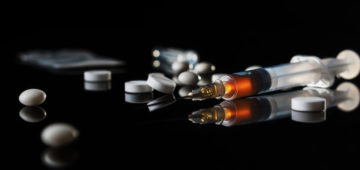- 06 December 2021
As the summer festival season begins, RSPH is calling on all music festivals where drug use is common to provide safety testing facilities as standard, where festival-goers can take any ‘substances of concern’ in their possession to establish their content and strength.
RSPH believes the move, which is backed by 95% of festival-goers, will help minimise the risk of serious health harm as a result of recreational drug use.
It also believes that such safety testing facilities should also become a standard feature of city centre nightlife areas with clubs where drug use is common, a move backed by 90% of clubbers.
The call comes in response to an increase in recent years of deaths related to the use of recreational ‘club drugs’, with ecstasy deaths in England and Wales up almost six-fold from 10 in 2010 to 57 in 2015. The rise is thought to have been largely caused by a corresponding increase in the average strength of ecstasy pills.
Drug safety testing was piloted in the UK at the Secret Garden Party and Kendal Calling festivals last summer, with the support of local police and public health. Initial results suggest almost one in five users (18%) opted to dispose of their drugs once aware of the true content, immediately reducing the amount of potentially harmful substances circulating on site. Service provider The Loop expects to extend the facilities to around eight UK festivals this summer.
An RSPH survey of festival-goers and clubbers suggests these results would be replicated if the service was rolled out more widely, with a third (32%) of festival-goers and three in 10 night clubbers (30%) saying they would definitely or probably not take their drugs if testing revealed their strength or composition to be different than expected. 45% of festival-goers and 46% of clubbers said they would take less or be more careful.
Shirley Cramer CBE, Chief Executive, RSPH, said: “The rise in drug-related deaths at music festivals and night clubs is a growing problem for policy makers, health authorities and events companies alike. While the use of stimulant ‘club drugs’ such as ecstasy can never be safe, and RSPH supports ongoing efforts to prevent them entering entertainment venues, we accept that a certain level of use remains inevitable in such settings. We therefore believe that a pragmatic, harm reduction response is necessary.
“The pilots carried out by The Loop last summer suggest providing drug safety testing facilities to festival-goers and night clubbers is a promising part of the equation in preventing these deaths – both by exposing and reducing the circulation of super strength or adulterated pills, and by providing an opportunity to impart practical harm reduction advice to an audience who would not normally engage with drug services. We urge events companies to make these facilities a standard part of the UK festival and clubbing landscape, and we urge both local and national police and public health authorities to provide the support that will enable this.”
Fiona Measham, Professor of Criminology, Durham University, and Director of The Loop, said: “It is a significant step forward for The Loop to have the Royal Society for Public Health support our Multi Agency Safety Testing. The reassuring findings from The Loop’s MAST pilots last year have increased the appetite for its roll-out this summer across the UK and further afield. We believe that prioritising public health over criminal justice for drug users at a time of growing concern about drug-related deaths at festivals and nightclubs can help to reduce drug-related harm both on and off site.”



